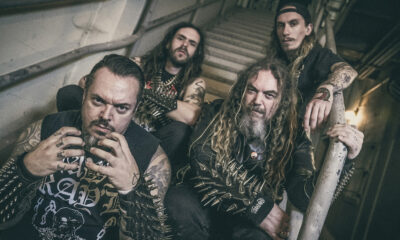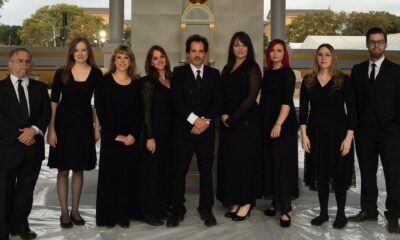Interviews
Interview with Idle Sons frontman Mike Eastick
After years of struggle and hard work, the Burlington, Ontario rock band known as the Idle Sons are finally starting to make a dent in Canada’s new rock scene. Despite the fact that the band has been together for a decade now, they are just starting to now receive mainstream recognition, largely thanks to their major label debut album Sixteen Seasons. The disc was produced by none other than Garth Richardson (a.k.a. GGGarth) who…

After years of struggle and hard work, the Burlington, Ontario rock band known as the Idle Sons are finally starting to make a dent in Canada’s new rock scene. Despite the fact that the band has been together for a decade now, they are just starting to now receive mainstream recognition, largely thanks to their major label debut album Sixteen Seasons. The disc was produced by none other than Garth Richardson (a.k.a. GGGarth) who also happened to produce one of the greatest records of the 1990s, Rage Against the Machine’s debut self-titled disc. Luckily we caught up with the Idle Sons lead singer and guitar player Mike Eastick for a chat before the band’s gig at the Reverb July 19th, 2006 in Toronto.
The Oxford Dictionary of Current English defines the word idle as “lazy, indolent, not in use, unoccupied and purposeless.” Where did you come up with the name Idle Sons for the band? Do all the members happen to be lazy and purposeless?
Mike: No we’re actually the complete opposite. The name came from what we figured our parents labeled ourselves before we got in the band, we weren’t really doing anything productive. At that time we probably were lazy and counter-productive if anything. And to be honest when we came up with it and we’re mulling it around we just liked the ring of it. So it was something we figured our parents referred to us as and we just thought it had a nice ring to it. We just don’t put that much stock in the name of the band you know, it doesn’t really mean anything, and we just didn’t want to have a really bad name like we use to have. We just wanted something that sounded good and had some backbone behind it.
Speaking of band names, I read that you guys originally came up with the name “Slurpymundae” for the band. How did you come up with this name and what precipitated you to change it to Idle Sons?
Mike: We have been together almost twelve years and we were fourteen or fifteen years old when we came up with that name so you know, you’re in high school and I think at the time it was funny to us or something. I couldn’t even come up with an answer for you about what it means because it’s either forgotten or… it’s just some dumb thing that we thought was funny. So the reason we changed it was because we wanted to be taken seriously and that was just a stupid name so you know, I think some people like it who knew our band before for like nostalgic reasons, like hometown people, but on the whole it was a good idea to change it I think.
It may come as a surprise to some fans, but the band has been playing together and releasing music now for over a decade. How did the four members meet and in turn, how did the band end up forming?
Mike: We originally met playing little league sports. Shawn and I played hockey together and Bruce and Ryan played little league baseball together. We met initially like that but in the later years just from playing in bands around the city and being in the Burlington music scene, we just eventually crossed paths and we needed members so we just sort of forged together out of a couple of other bands and that was almost twelve years ago now so we’ve been going strong ever since.
After changing your name to Idle Sons, you landed a major label album deal, largely thanks to a three song demo you recorded with the help of fellow Burlington rock band Finger Eleven. How did you end up meeting Finger Eleven and what members of the band contributed the most to the demo?
Mike: Well we grew up with them so we knew them before all that. We just helped each other out, mainly at the time, they helped us out right obviously. It was Rick and James who came in and we worked on three songs together and we sent it out and we just happened to get a good response. But we’ve known them for years, we’re sort of in the same circle of friends before the music stuff came up in Burlington so it was just natural to have them come in and help us out and they were more than willing to do it which was amazing. It’s great to have people that are willing to help you out and go out of their way to help you succeed after they’ve had some success.
Speaking of Finger Eleven, do you still keep in touch with those guys? If so, any news on a new album from them?
Mike: They’re um, they’ve either just left or they’re leaving in the next couple of days to go to Chicago to record their new record. They wrote for a while and they just wanted to put together the best songs that they thought they could put on one disc. So they have the material now so they’re going off in the next week or so. I’m not sure when it’s going to be released, but it’s going to be soon because they’re recording it now.
The story behind the long road to releasing your debut album Sixteen Seasons is quite interesting as it was suppose to be released four years ago under the title Hell or High Water. Can you let us in a bit on the whole story behind the delay in the release of the album?
Mike: The name Sixteen Seasons comes from the duration of time it took us from when we signed our first deal with Atlantic about four years ago and then we recorded thirteen songs, um, that deal ended up going south. And then we worked our butts off for two years to get another opportunity with EMI and ah, they let us record new songs, record old songs and remix the remainder of the songs. So it’s been a long road with a lot of bumps in that road, but, yeah Sixteen Seasons wasn’t going to come out four years ago, it’s just when we got signed and then we went and recorded it…. So we just thought the name was a good reference to the amount of time, energy and struggle we went through to actually get the thing out there. So yeah, it has been long and tedious but it’s worth it you know? We get the chance to get it out there now and play shows and promote it, so we’re doing what we want to do.
So eventually after sorting out all of these issues, you finally got around to properly recording your debut Sixteen Seasons with the very well known and well respected producer GGGarth Richardson. How did the band end up meeting and hooking up with such a huge producer like Richardson for the album?
Mike: They asked us to make a list out of possible guys that we’d like to work with, you know, feasible targets, we’re not going to ask for huge dudes but luckily enough we ended up getting one. It was funny because he was at the top of our list but he wasn’t available, we were going to do it with someone else and at the last minute the guy we were going to do it with became unavailable and GGGarth became available. He heard the music and he liked it, we talked on the phone and it didn’t take much. We knew what we were getting ourselves into so we were all over it and ah, I think it was sort of a lucky break and we jumped at it when the opportunity came up. And we forged a great relationship, we’re buddies now and the next project we do is definitely going to be with him no doubt so, yeah he’s an awesome guy. He’s just a fun loving Canadian dude, he loves the Maple Leafs, he loves to kick back and just have a drink, and he’s a great guy. It’s a good relationship to have.
Speaking of Richardson, what was it like working with him in the studio? What do you think his greatest asset was in the recording of the disc?
Mike: It’s pretty cool because he’s got a pretty unique ability to pull out a performer’s, or band’s live energy from a show. We tended to overproduce our recordings in the past which may be a little bit stale as far as the energy created from a live show, you tend to lose that a little bit if you go into the studio and try to get everything too perfect. So we went for energy over perfection, we just got takes that had passion in them and feeling more so than perfect notes and stuff like that. So we feel the end result is more of a raw, unpolished feeling and that’s what we really wanted. So if I had to pick an asset of his, that’s his thing, he’s able to extract that rawness of the live performance and get it down on tape whereas, some other producers end up doing things far too slick and overproduced and it loses its energy.
Of the twelve songs on Sixteen Seasons, four are leftovers intact from Hell or High Water, four are reworked from their original form on Hell or High Water and four songs are brand new. How did you decide what songs to keep and what songs to scrap from Hell or High Water? Did this difficult decision create any conflict within the band?
Mike: Most of the decisions were pretty obvious for us, the only one that was tricky was when we were trying to choose whether or not to change a song called “The Fold” and to keep “This Evening,” we had to choose between the two. And it took us a while to decide but what we did was just sit down and listened to the tracks back to back and just made a collective decision. We always do things when we come in conflict, we just vote and if three people vote one way, that’s the way it goes. We ended up all agreeing, but that was the only conflict we had, but it wasn’t really an argument so to speak, it was just, a couple of us weren’t sure which way to choose. So, the ones we got rid of, we didn’t have to get rid of too many but they were usually the oldest ones and the ones that we just felt didn’t fit in with the landscape of the record anymore with the new songs coming in and reworking the other songs and breathing new life into them. So it wasn’t too hard of a choice to pick the existing songs on the record.
Making an album out of brand new songs and older songs written at different times can be a difficult endeavor. Were you at all worried that Sixteen Seasons would sound disjointed because the songs were not all written in the same sessions?
Mike: Um, well I think, again it goes back to picking the songs for the record you know. I think we made sure we picked the ones we thought coherently fit in the package with the rest of the songs. I mean, the record does ebb and flow, it’s got its slower songs, harder songs, faster songs but that’s still how we’re writing. I never liked to listen to a record with the same twelve songs on them, I like variety, you know, I don’t like listening to all slow songs or all hard songs, I like it when an album is more I’d say diverse or eclectic.
The present seems to be going very well with the band with the recent release of Sixteen Seasons and your current tour of Ontario that will wrap up in early August. What does the band have planned for the rest of 2006?
Mike: Um, for the rest of the year, we’ll pretty much be touring non stop. The record was just released pretty recently so we think it’s still got a lot of life in it so we’ll be back and forth across Canada I’m sure and we might eventually be getting down into the US for some dates down there. So yeah, really we’ll probably be touring for the rest of 2006 and maybe into 2007. [ END ]
-

 Alternative/Rock2 days ago
Alternative/Rock2 days agoSheryl Crow Has Plenty of Fun at The Piece Hall in Halifax [Photos]
-

 Alternative/Rock5 days ago
Alternative/Rock5 days agoIconic New Wave Punks Blondie Kick Off a Spectacular Summer Line-up at The Piece Hall in Halifax [Photos]
-

 Indie7 days ago
Indie7 days agoIndie Legends James Put on Unmissable Show at Leeds First Direct Arena [Photos]
-

 Alternative/Rock5 days ago
Alternative/Rock5 days agoThe V13 Fix #016 w/Foreign Hands, Earthtone9, Wage War & More
-

 Metal1 day ago
Metal1 day agoCavalera: “To me, that is purity that only happens in bands that have brothers. It’s crazy… It’s a connection….”
-

 Essays & Editorials5 days ago
Essays & Editorials5 days agoVerse & Vision: John Carroll on the Craft and Challenges of Publishing
-

 Classical1 week ago
Classical1 week agoThe Divine Hand Ensemble Premiere Juicy “Peaches En Regalia” Music Video
-

 Folk2 days ago
Folk2 days agoBoston’s Tiny Habits Talk Celebrity Fans, Intimate Gigs and Online Covers




